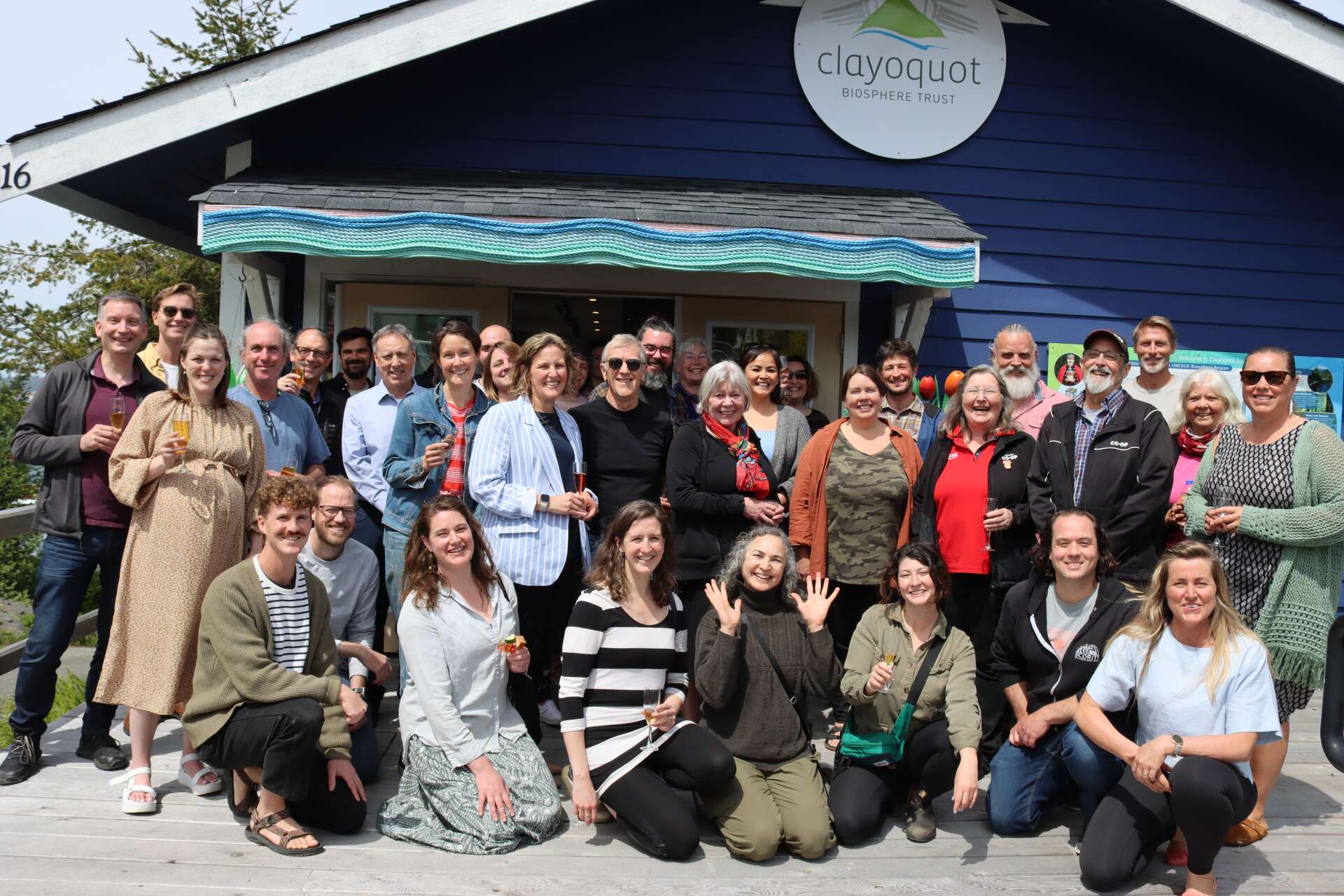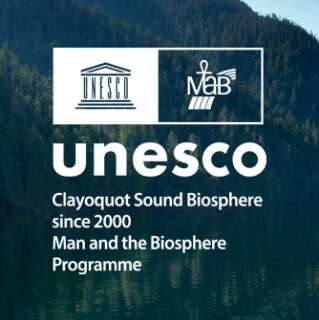UNESCO Biosphere Region Toolkit
Website Content
Short Version
Within the ha-haḥuułii (territories) of the five central Nuu-chah-nulth First Nations (Hesquiaht, Ahousaht, Tla-o-qui-aht, Yuułuʔiłʔatḥ , and Toquaht), is the Clayoquot Sound UNESCO Biosphere Region (CSBR). UNESCO biosphere regions are recognized by the United Nations for having ecosystems of global significance and communities that have come together for stewardship, conservation, and prosperity. Over 750 biosphere regions, such as the Galápagos Islands and the Serengeti Plains are a part of the UNESCO World Network of Biosphere Regions.
The CSBR designation recognizes our efforts towards a balanced relationship between people and the environment, a balance inherent in the region's Nuu-chah-nulth (Indigenous) culture. Designated with support from all regional communities in 2000, the CSBR is renowned for its breathtaking beauty, rich biodiversity, and commitment to finding a better way to live and work together. The designation highlights the region's role as a global conservation leader, with settlers beginning to strive alongside Indigenous residents to build healthy communities capable of pursuing climate resilience, reconciliation, and biodiversity stewardship.
The Clayoquot Biosphere Trust is the local organization that stewards the spirit and intent of the UNESCO biosphere designation and is the only organization in Canada that is both a community foundation and a UNESCO biosphere region.
For more information visit: clayoquotbiosphere.org/our-biosphere-region/overview
Long Version
Within the ha-haḥuułii (territory) of Hesquiaht, Ahousaht, Tla-o-qui-aht, Yuułuʔiłʔatḥ , and Toquaht First Nations, the Clayoquot Sound UNESCO Biosphere Region (CSBR) is one of British Columbia’s three biosphere regions and one of 19 in Canada. UNESCO biosphere regions are recognized by the United Nations for having ecosystems of global significance and communities that have come together for stewardship, conservation, and prosperity. Over 750 biosphere regions are a part of the UNESCO World Network of Biosphere Regions. Notable examples include the Galápagos Islands in Ecuador, Serengeti-Ngorongoro in Tanzania, and Yellowstone National Park in the United States. The CSBR designation recognizes our effort to balance environmental conservation and socioeconomic development— a balance inherent in Nuu-chah-nulth (Indigenous) culture.
Designated with support from all regional communities in 2000, the CSBR is renowned for its breathtaking beauty, rich biodiversity, and commitment to finding a better way to live and work together. The designation highlights the region's role as a global conservation leader, with settlers beginning to strive alongside Indigenous residents to build healthy communities capable of pursuing climate resilience, reconciliation, and biodiversity stewardship. Home to some of the world's last remaining old-growth coastal temperate rainforests, provides crucial habitat for many endangered, vulnerable, and threatened species. As development pressures on old-growth forests increase globally, the ecological importance of Clayoquot Sound is even more critical.
A UNESCO (United Nations Educational, Scientific, and Cultural Organization) biosphere region is a globally recognized site under UNESCO's Man and the Biosphere (MAB) Programme, dedicated to fostering a balanced relationship between people and the environment. UNESCO designations hold internationally recognized status and highlight the site's contribution to global efforts in sustainability and conservation, ensuring that these areas remain special places to live, work, and visit. It’s important to note that the designation does not give UNESCO any control or rights over the biosphere regions, but brings recognition and an opportunity to network with sites with shared values nationally and internationally.
The Clayoquot Biosphere Trust is the local organization that stewards the spirit and intent of the UNESCO biosphere designation and is the only organization in Canada that is both a community foundation and a UNESCO biosphere region.
For more information: clayoquotbiosphere.org/our-biosphere-region/overview
Social Media Content
Option 1
Did you know that [insert name of business/organization] is located within the Clayoquot Sound UNESCO Biosphere Region (CSBR)? This area was designated in 2000 to recognize the global significance and uniqueness of the region and it's commitment to biodiversity conservation, sustainable development, and reconciliation. At this time, there are over 750 UNESCO-designated biosphere regions across 135+ countries, and currently 19 in Canada.
The CSBR designation recognizes our effort to balance environmental conservation and socioeconomic development, a balance inherent in the region's Nuu-chah-nulth (Indigenous) culture. Designated with support from all regional communities in 2000, the CSBR is renowned for its breathtaking beauty, rich biodiversity, and our commitment to finding a better way to live and work together. The designation highlights the region's role as a global conservation leader, with settlers beginning to strive alongside Indigenous residents to build healthy communities capable of pursuing climate resilience, reconciliation, and biodiversity stewardship.
To learn more visit, https://clayoquotbiosphere.org/our-biosphere-region/overview
#ClayoquotSoundBiosphereRegion #UNESCObiosphere
Option 2
We are proud to be located within the Clayoquot Sound UNESCO Biosphere Region! This globally recognized site, exclusively designated by the United Nations Educational, Scientific, and Cultural Organization (UNESCO), highlights the exceptional natural and cultural value of the region while promoting a balanced relationship between people and the environment.
This region grew to become a UNESCO biosphere from a grassroots movement of a small but passionate group of community members—people who were seeking better ways of advancing the local region with a long-term commitment to sustainability. In a nutshell, the UNESCO biosphere designation is all about keeping this region a special place to live, work and visit.
To learn more, visit https://clayoquotbiosphere.org/our-biosphere-region/overview
#ClayoquotSoundBiosphereRegion #UNESCObiosphere
Social Media Images
Feel free to use the images provided or use your own pictures of the region! The images can be downloaded below, along with our logos. If you have any questions, please email marianne@clayoquotbiosphere.org.
Please credit and tag Clayoquot Biosphere Trust on social media (Facebook, Instagram, LinkedIn & YouTube).





Additional information
Why use region instead of reserve?
Both at home and abroad, there's been a lot of talk about modernizing UNESCO terminology from Biosphere Reserve to Biosphere Region. In Canada, the word Reserve can have negative interpretations tied to the Indian Act and colonization. In other countries, some languages interpret it to mean an exclusive place where humans should not go. Neither of these meanings is a good fit with the mission of UNESCO Biospheres -- inspiring a positive future by connecting people and nature today.
How can you help?
If any written materials (website, brochures, etc.) mention the Biosphere designation, please change the word “Reserve” to “Region”. Let's work together to increase the vitality of the communities and ecosystems in the Biosphere Region we call home.

